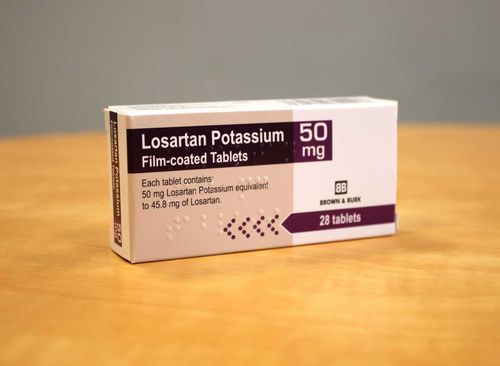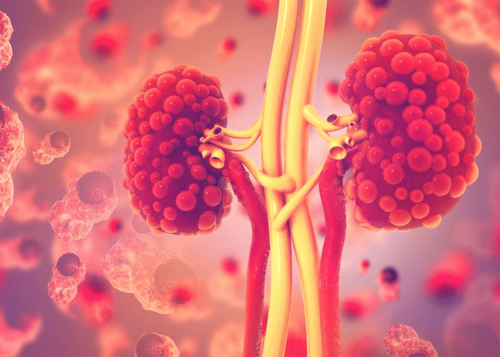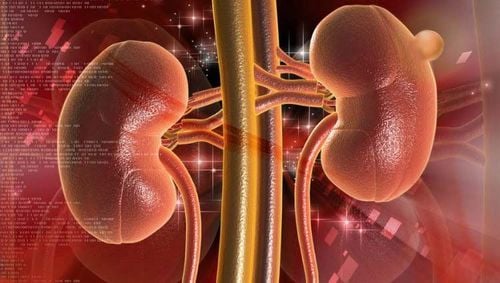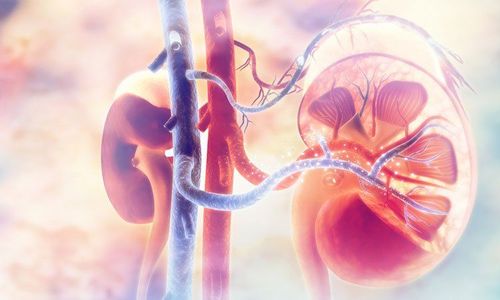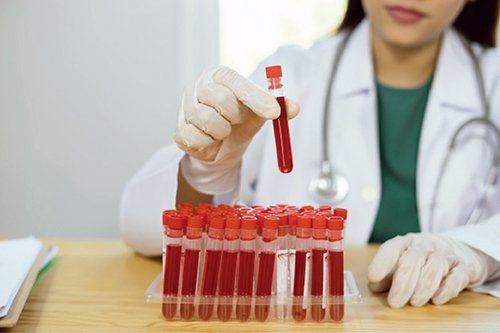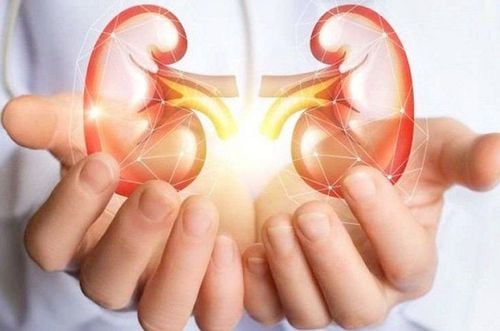This is an automatically translated article.
The article was expertly consulted by MSc Nguyen Thi Thanh Thuy, Doctor of Internal Medicine - Dialysis - Kidney Transplant, Vinmec Central Park International General Hospital.Compared with other kidney diseases such as glomerulonephritis, nephrolithiasis, renal failure, IgA nephropathy (IgA nephropathy) is a relatively rare disease. Symptoms of the disease are often very poor, so many patients easily ignore it. Meanwhile, if not detected and treated well, the disease can lead to many dangerous complications.
1. What is IgA nephropathy?
IgA nephropathy (also known as Berger's disease) is a condition in which the glomeruli (filtering units of the kidney) become inflamed due to immune mechanisms, gradually causing chronic kidney disease, kidney failure in some cases. IgA nephropathy is one of the most common primary glomerulonephritis in the world. Typically, this disease accounts for 30-35% of all primary glomerulonephritis in Asian patients, but it can also be up to 45%, equally in men and women. In addition, men have a higher risk of disease and younger people are more susceptible, according to a recent report in the US, the disease also runs in families and researchers believe that genetic factors play a role in the development of the disease. cause disease.The disease was diagnosed based on pathological results of renal tissue with immunofluorescence staining, with moderate or higher glomerular IgA deposition.
2. Causes of IgA . nephropathy
The causes of IgA nephropathy are still poorly understood. This is not necessarily just a kidney disease, but can affect other organs. IgA is produced by the body's immune system in response to infections, viruses..., for some reason (possibly genetic factors) IgA is produced defective, the body's immune system recognizes The presence of a foreign body causes an antigen-antibody reaction. This antigen-antibody complex travels through the blood stream, stays in the glomerulus, and causes glomerulonephritis. This inflammation causes the leakage of red blood cells and protein in the urine gradually over months and years, causing kidney damage, fibrosis and loss of kidney function.3. IgA . nephropathy symptoms
IgA nephropathy has a very variable clinical presentation, with some patients having only benign microscopic hematuria incidentally detected during general physical examination, but there are also patients presenting with progressive glomerulonephritis. rapidly lead to kidney failure. Usually, young patients develop gross hematuria (visible to the naked eye) after an episode of upper respiratory tract infection or enteritis. Older patients often present with proteinuria, asymptomatic microscopic hematuria, or hypertension. Some cases are detected when they have stage 3 or higher chronic kidney failure.Some common symptoms of the disease
Gross hematuria (urine is red like blood or pink like meat wash that can be seen with the naked eye) often during or after a respiratory infection upper or inflammatory bowel disease. The patient has pain in the side, foam in the urine, swelling in the hands and feet, high blood pressure, and low-grade fever.
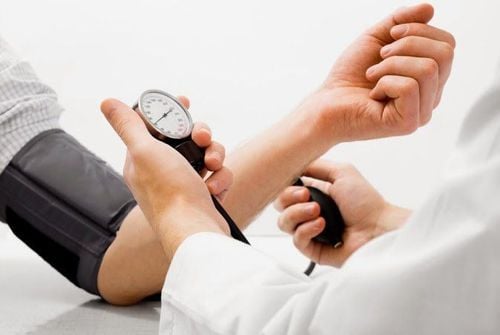
Tăng huyết áp là một triệu chứng của bệnh thận IgA
4. Is IgA nephropathy dangerous?
IgA nephropathy is one of the important causes of chronic kidney failure. Prognosis of IgA nephropathy depends on 3 factors at diagnosis: Proteinuria >1g/day, hypertension and extent of damage to glomeruli, tubules, and interstitial tissue on renal biopsy. The more risk factors, the higher the risk of chronic kidney disease and loss of kidney function. After 10 years of diagnosis, approximately 10% of patients with IgA nephropathy have normal renal function at diagnosis with renal failure.Because the signs of the disease are often quite poor, people with the disease are easy to ignore. And if not detected, monitored and treated promptly, IgA nephropathy can lead to end-stage chronic renal failure, increasing the mortality rate for patients in some cases.
5. Tests to do when you have IgA nephropathy
After the examination, the doctor who suspects the disease may ask the patient to perform the following testsUrine: Find the presence of red blood cells and protein in the urine Blood: Assess kidney function, quantify protein, cholesterol and other evaluations if needed Abdominal ultrasound to assess current kidney status Kidney biopsy if indicated: A small piece of tissue from your kidney will be removed through a special needle under ultrasound guidance, then which are stained by different methods and viewed under a microscope. If you have IgA nephropathy, the results will show glomerular IgA deposition.
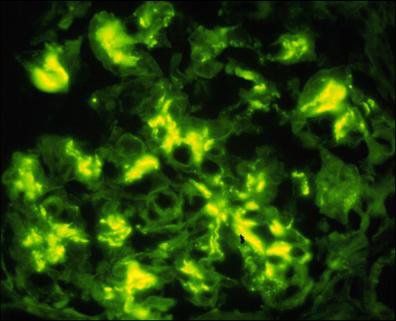
Hình ảnh cầu thận có lắng đọng IgA khi nhuộm miễn dịch huỳnh quang (Nguồn ảnh: Internet, UNC Kidney Center)
6. How to treat IgA . nephropathy
Depending on the condition of the disease and the degree of kidney failure, the doctor will have an appropriate treatment course for each patient. Current treatment measures mainly slow the progression of kidney damage, includingCorticosteroids and immunosuppressive drugs: Reduce the activity of the immune system, leading to a decrease in the inflammatory process of the kidneys. ACE or angiotensin II receptor blockers: Helps control blood pressure and proteinuria Some doctors may prescribe fish oil. In addition, patients with IgA nephropathy also need to keep their kidneys healthy by maintaining a low-salt, low-protein diet if kidney failure is present, drinking plenty of water, not taking stimulants, and taking time to rest. reasonable. If the disease is detected early when the disease is still mild, the patient can live a normal healthy life, without the need for a strict diet or treatment. However, if the disease has complications such as high blood pressure, kidney failure, the patient needs to adhere to a strict diet and use of drugs.
Prevention is always better than cure, so everyone needs to have their kidney function checked annually (blood and urine tests), especially those who have a family member with kidney disease in the past, who Patients with high blood pressure, diabetes, etc. Patients who experience the onset of gross hematuria during or after episodes of upper respiratory tract infection should take precautions to limit future episodes of similar upper respiratory tract infections. .
Please dial HOTLINE for more information or register for an appointment HERE. Download MyVinmec app to make appointments faster and to manage your bookings easily.




